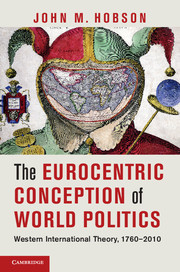Book contents
- Frontmatter
- Contents
- Figures
- Tables
- Acknowledgments
- 1 Introduction
- Part I 1760–1914
- Part II 1914–1945 The high tide of manifest Eurocentrism and the climax of scientific racism
- 6 Anti-imperialism and the myths of 1919
- 7 Racist and Eurocentric imperialism
- Part III 1945–1989 Subliminal Eurocentrism in international theory
- Part IV 1989–2010 Back to the future of manifest ‘Eurocentrism’ in mainstream international theory
- Part V Conclusion Mapping the promiscuous architecture of Eurocentrism in international theory, 1760–2010
- References
- Index
7 - Racist and Eurocentric imperialism
racist-realism, racist-liberalism and ‘progressive’ Eurocentric liberalism/Fabianism, 1919–1945
Published online by Cambridge University Press: 05 June 2012
- Frontmatter
- Contents
- Figures
- Tables
- Acknowledgments
- 1 Introduction
- Part I 1760–1914
- Part II 1914–1945 The high tide of manifest Eurocentrism and the climax of scientific racism
- 6 Anti-imperialism and the myths of 1919
- 7 Racist and Eurocentric imperialism
- Part III 1945–1989 Subliminal Eurocentrism in international theory
- Part IV 1989–2010 Back to the future of manifest ‘Eurocentrism’ in mainstream international theory
- Part V Conclusion Mapping the promiscuous architecture of Eurocentrism in international theory, 1760–2010
- References
- Index
Summary
Introduction: racist and Eurocentric imperial conceptions of world politics
In the introduction to the last chapter I laid out five key revisionist arguments that challenge the conventional ‘mythical’ historiography of 1919 and the interwar period. In this chapter I shall elaborate on several of those key claims, the first of which proposes that IR theory did not appear all of a sudden after World War I in some kind of miraculous virgin birth, but continued on from its pre-1914 roots in paternalist-Eurocentrism and offensive racism. And this in turn links up to my second revisionist claim: that interwar international theory was not monopolized by ‘idealism’ or liberalism because it also exhibited a vibrant racist-realist stream that had emerged after 1889 (as I discussed in Chapter 5). Notwithstanding the references to the usual suspects – Carr, Morgenthau, Niebuhr and Spykman – nevertheless, as Lucian Ashworth perceptively notes, what demands attention is the silence in the IR historiographical imagination concerning the place of realism in the pre-1945 era; an omission that is made all the more curious in the light of the conventional belief that the interwar period is supposed to have witnessed the so-called ‘realist-idealist debate’ (Ashworth 2011: 3). Thus this discussion will provide further justification for the need to reduce the ontological status of 1919.
A third myth that I will challenge concerns the conventional image of interwar ‘idealism’ (or liberalism and left-liberalism). Rather than viewing it as entailing an optimistic vision of a world based on the inherent harmony of interests between cooperating self-determining states – a vision that is most closely associated with Woodrow Wilson – I seek here to reveal its dark imperialist side, which rests on the idea of Western hyper-sovereignty and the continuing denial of sovereignty to many of the Eastern polities. Paradoxically, my argument here dovetails to an important extent with Carr’s critique of ‘idealist’ imperial politics. For his critique of the ‘idealist’ conception of the ‘harmony of interests’ is related directly to an imperialist political sensibility (Carr 1946/1981: 75–80).
- Type
- Chapter
- Information
- The Eurocentric Conception of World PoliticsWestern International Theory, 1760–2010, pp. 150 - 182Publisher: Cambridge University PressPrint publication year: 2012



